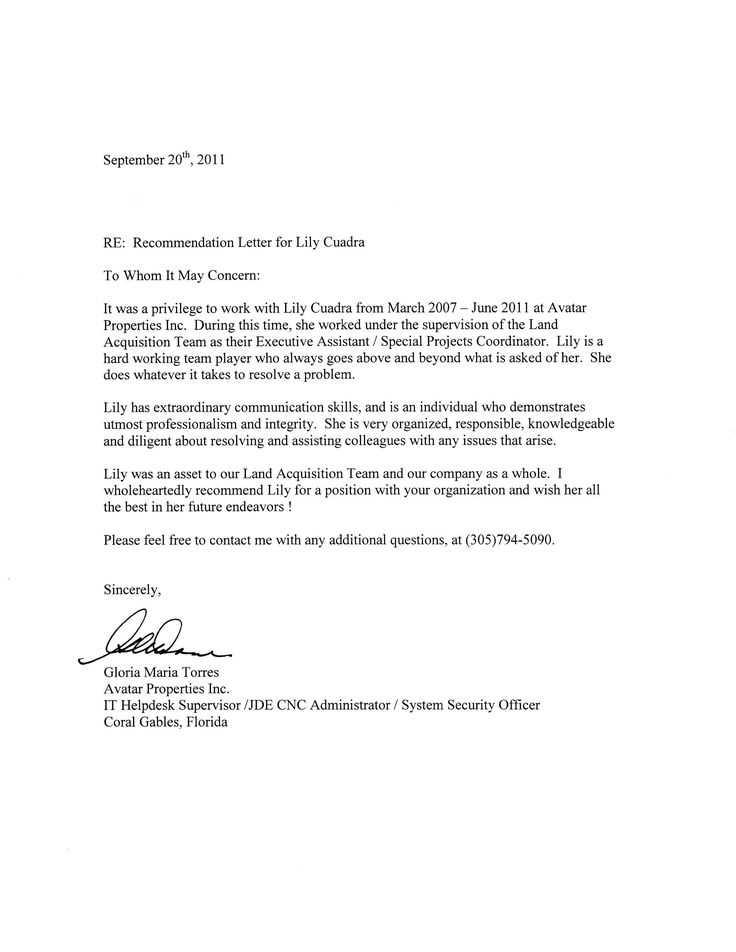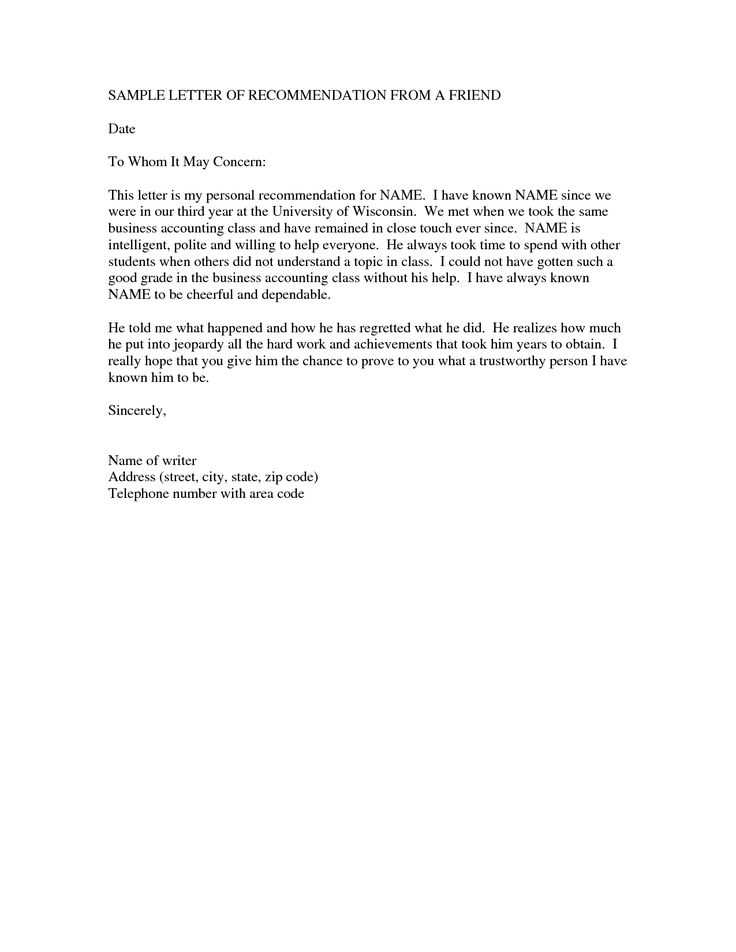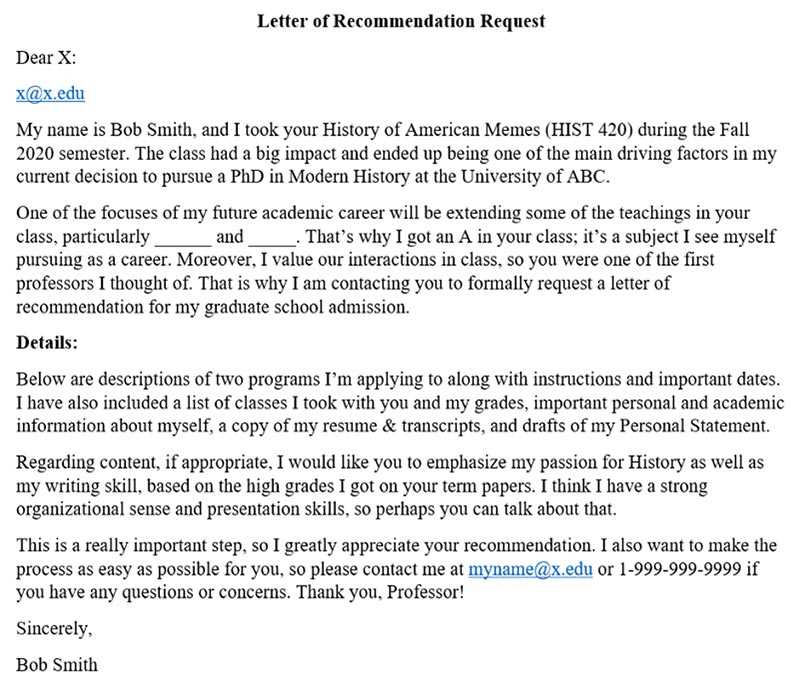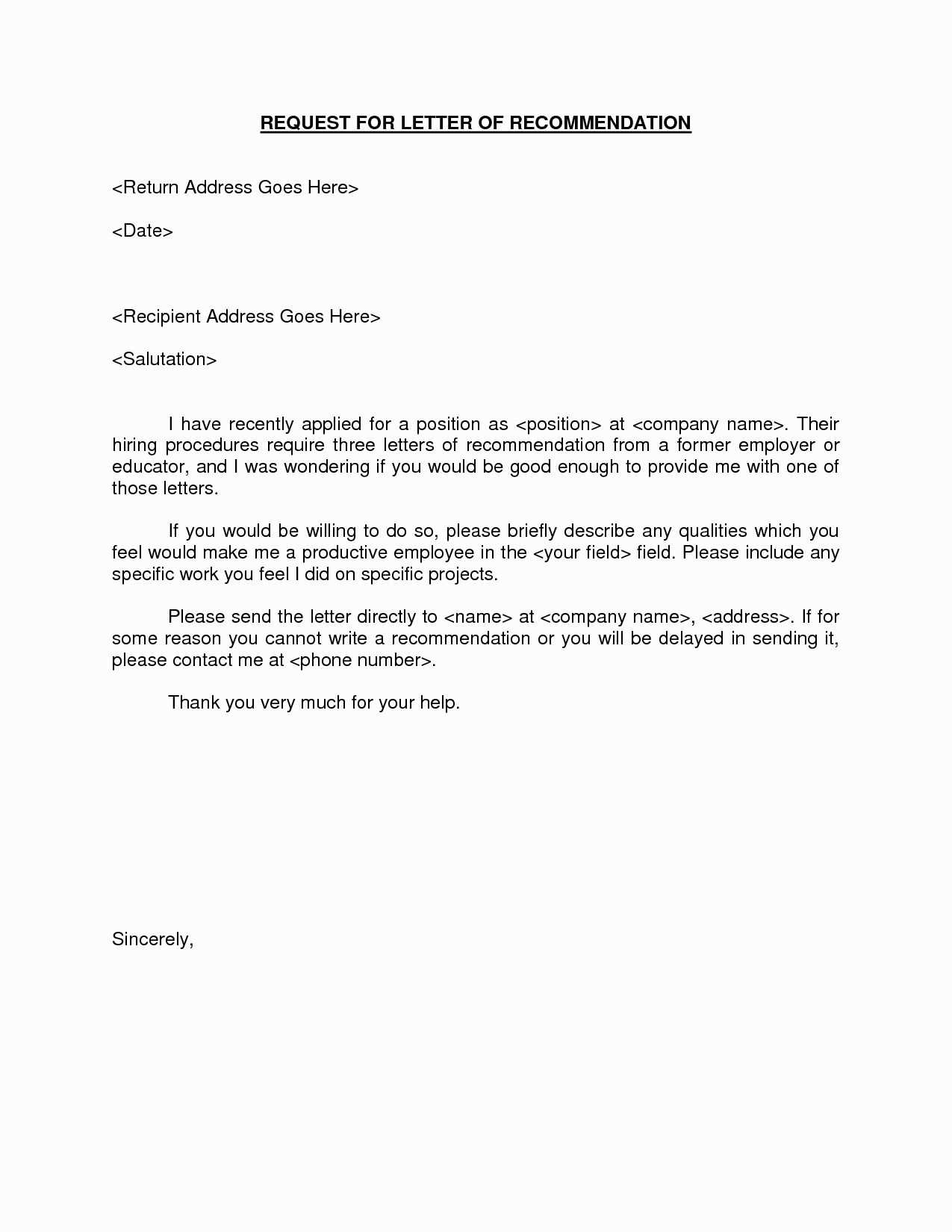How to Request a Letter of Recommendation Template

When seeking support from someone who can vouch for your skills and qualifications, crafting a clear and respectful request is essential. Whether you’re applying for a job, scholarship, or academic program, a well-thought-out inquiry can make a significant difference in the outcome. Understanding the process of making such a request ensures you approach the right individuals and provide them with all the necessary details to help them assist you effectively.
Effective communication is key to making sure your request is well-received. By outlining your goals and specifying what you need from your endorsers, you set the stage for a positive response. A polite and professional tone not only shows respect for the person’s time but also highlights your sincerity in seeking their help.
Tailoring your approach to each person you reach out to is equally important. Whether it’s a professor, colleague, or supervisor, personalizing your message can strengthen the chances of getting a favorable reply. In the following sections, you’ll learn how to structure your request, ensuring it meets the expectations of potential endorsers while also making it easy for them to provide the support you need.
Essential Tips for Requesting Recommendations
When you need support from someone to highlight your strengths and qualifications, it’s important to approach the task thoughtfully. A well-structured inquiry will increase your chances of receiving a positive response and ensure that your request is met with respect and professionalism. Understanding how to navigate this process effectively can make all the difference in achieving your goals.
Prepare Your Request Thoughtfully
Before reaching out to anyone, ensure that your approach is clear and considerate. This can help avoid confusion and demonstrate your respect for their time. Here are a few key steps to take:
- Choose the right person who is familiar with your abilities and achievements.
- Ensure that they have enough time to craft a thoughtful response.
- Clearly explain the purpose of your request and why their input is valuable to you.
Be Clear and Specific
While it’s important to be polite, your request should also provide all the necessary details. This allows the person you’re reaching out to understand exactly what is needed from them. Here are some helpful elements to include:
- The context in which the endorsement is needed (job, academic program, etc.).
- The skills or qualities you’d like them to highlight based on your relationship with them.
- A deadline or timeline for when their input would be most beneficial.
Understanding the Importance of a Strong Request
When seeking support from someone who can attest to your abilities, the manner in which you present your request plays a crucial role in determining its success. A well-crafted inquiry not only demonstrates professionalism but also sets the foundation for a positive response. Approaching the situation with clarity and respect increases your chances of receiving the endorsement you need.
Establishing Clear Expectations
A strong request ensures that both you and the person you’re reaching out to are on the same page. Clearly outlining your needs helps avoid confusion and provides them with a roadmap to deliver the most relevant and helpful input. By being specific about what you need, you enable the person to assist you effectively.
Building Positive Relationships
How you approach others reflects your level of respect for them and their time. A thoughtful and polite request fosters good will and strengthens professional relationships. It can encourage the person to help you, as they see that you value their support and are considerate of their commitments.
Creating a Professional Request Format
When you reach out to someone for their support in endorsing your qualifications, having a clear and well-organized structure for your request is essential. A professional format ensures that all necessary details are communicated efficiently, making it easier for the person you’re contacting to understand your needs and respond accordingly. Crafting such a structure also reflects your respect for their time and expertise.
To create an effective request, include key information such as the purpose of your inquiry, the specific areas you want highlighted, and a clear timeline for submission. This approach not only facilitates a smooth process but also increases the likelihood of receiving a positive and timely response.
Key Elements to Include in Your Request

When preparing your request for an endorsement, it’s essential to include specific details that help the person you’re reaching out to understand what’s needed. A clear and concise structure ensures that all necessary information is communicated, making it easier for them to provide the support you require. Including the right elements will increase the chances of receiving a thoughtful and relevant response.
Make sure to provide context, such as why you need the endorsement and the specific qualities or skills you’d like them to emphasize. Also, include any important deadlines and offer any materials that might help them craft a more tailored response. This will make the process smoother for both you and the person assisting you.
Customizing Your Request for Different Purposes
Every situation where you seek someone’s endorsement requires a slightly different approach. Customizing your request ensures that it aligns with the specific context, whether it’s for a job, academic application, or other opportunities. Adapting your message helps convey why their support is particularly valuable for your goals, making it more likely to receive a positive response.
Adjusting for Career Opportunities

When requesting assistance for job applications, focus on skills and experiences that are most relevant to the position you’re pursuing. Highlight the aspects that align with the job’s requirements to ensure the person you approach understands how their endorsement will support your career aspirations.
- Emphasize professional achievements.
- Specify the job position and the qualities the employer is seeking.
- Explain why their endorsement is meaningful to your career path.
Modifying for Academic Pursuits
When reaching out for educational applications, emphasize academic performance, research abilities, and character traits that would benefit the admissions committee or scholarship board. This helps ensure that the person you’re contacting can highlight the specific attributes needed to strengthen your application.
- Discuss academic achievements, projects, and research experience.
- Link your strengths to the program’s goals or values.
- Provide specific examples of your academic capabilities.
Adapting to Academic or Career Needs

When requesting support, it’s essential to tailor your approach based on the specific context in which you’re seeking assistance. Whether you’re applying for further studies or pursuing career opportunities, understanding the unique demands of each situation can help ensure that your request resonates with the person you’re contacting. By adapting your message, you can highlight the qualities most relevant to the goal you’re trying to achieve.
Focusing on Career-Related Qualities
For professional applications, emphasize attributes that align with the industry or position you’re targeting. You may want to highlight your leadership skills, achievements, and practical experience that demonstrate your ability to succeed in the role. Here’s how you can adjust your request:
- Skills: Stress your technical and soft skills related to the job.
- Experience: Focus on specific accomplishments in your field.
- Values: Align their support with the company’s values or mission.
Highlighting Academic Strengths
When preparing a request for educational purposes, you should emphasize your academic abilities and achievements. Whether it’s for a degree program or scholarship, showcasing your intellectual curiosity, research skills, and commitment to learning is essential. Tailor your approach with these considerations:
- Academic achievements: Mention awards, projects, and coursework.
- Research skills: Highlight any research experience or publications.
- Character: Focus on personal qualities like discipline and perseverance.
How to Approach Potential Recommenders
When seeking support from someone to vouch for your skills and abilities, it’s important to approach them with respect and clarity. How you initiate the conversation can set the tone for a successful outcome. Understanding the best ways to approach potential endorsers will make them more likely to help, while also making the process easier for both parties.
Choosing the Right Person
Selecting the right individual to provide their endorsement is crucial. It’s important to consider someone who knows you well and can speak to your strengths in a meaningful way. The closer your relationship with the person, the more powerful their words will be. Here’s a helpful guide for selecting the ideal person:
| Criteria | Ideal Recommender |
|---|---|
| Familiarity | Someone who has worked closely with you or understands your abilities. |
| Relevance | A person whose background aligns with the goal you’re trying to achieve. |
| Authority | Someone with credibility in the field you’re aiming for, such as a supervisor or professor. |
How to Start the Conversation
Starting the conversation respectfully and thoughtfully will help set the stage for a positive response. When you reach out, be clear about your goals and explain why you believe they are the right person to help you. Make sure to express your gratitude for their time and consideration. Below are some tips for initiating the conversation:
- Be polite and professional in your request.
- Explain the context and why their endorsement is valuable to you.
- Give them ample time to consider your request before following up.
Building a Relationship with Your Recommender
Establishing a strong, positive connection with someone who can support you is crucial. A meaningful relationship helps ensure that your request is taken seriously and can lead to a more personalized and compelling endorsement. By investing time in fostering a relationship, you increase the chances of receiving the support you need, while also demonstrating your respect and gratitude for the person’s involvement.
Rather than approaching a potential supporter only when you need help, aim to build rapport and maintain communication over time. This ongoing connection ensures that when the time comes to request support, the individual is already familiar with your capabilities and character. Regular interaction not only strengthens the bond but also allows them to see your growth and potential firsthand.
Key Actions to Build a Strong Connection:
- Show appreciation: Recognize their time and guidance, even in everyday interactions.
- Stay engaged: Keep them updated on your progress and achievements.
- Seek advice: Asking for their perspective on projects or decisions shows respect for their expertise.
By fostering a genuine connection, you not only gain an advocate but also demonstrate that you value their mentorship and support, making it more likely they’ll be willing to assist you when the time comes.